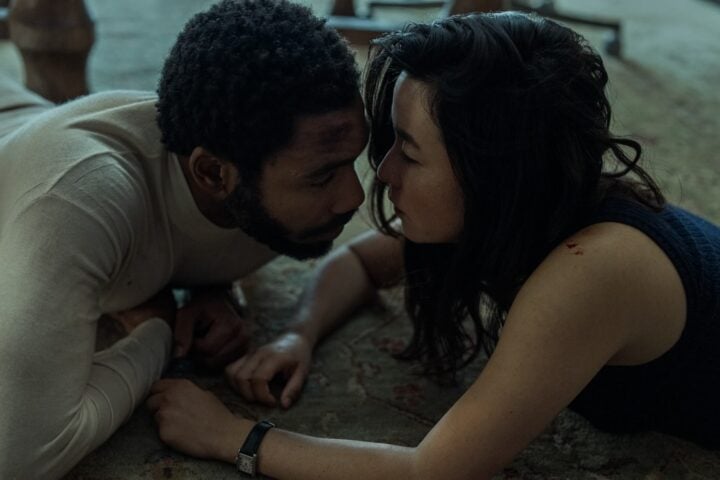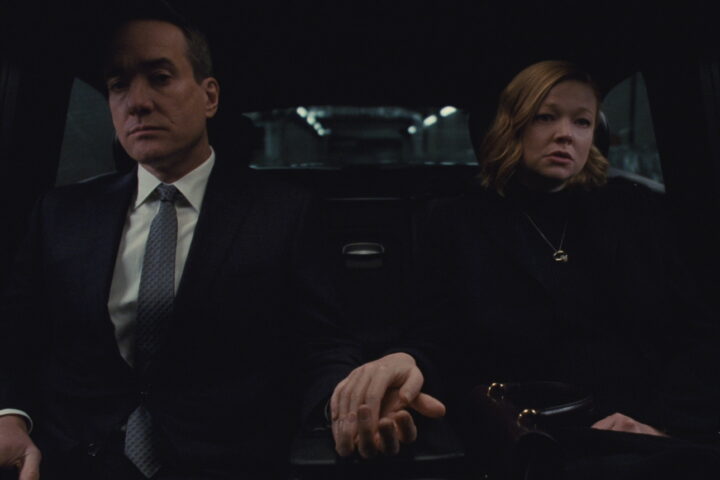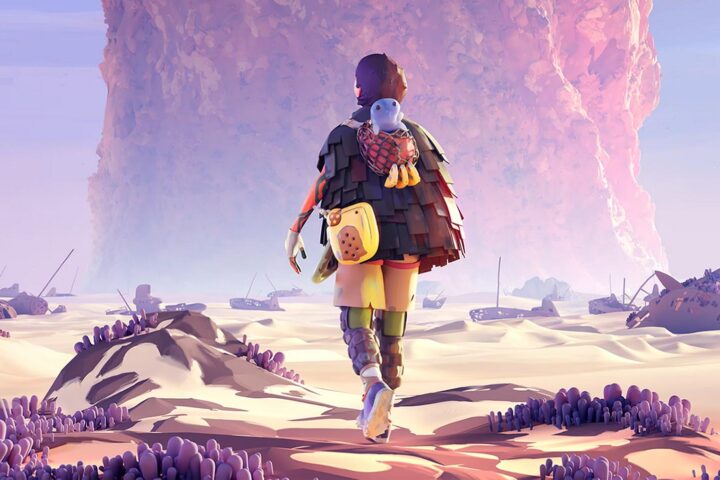We’re well into the so-called post-Peak TV era. Tightening budgets and consolidating streaming platforms suggest an uncertain future for the medium. With the exception of new staples like The Last of Us and Poker Face, many of the best television shows of 2023 wrapped things up with their final seasons (The Marvelous Mrs. Maisel, Succession, Barry, Reservation Dogs) or had only limited runs (Dead Ringers, Fleishman Is in Trouble). And due to the Hollywood strikes, the TV landscape could look quite different by this time next year.
Yet, Succession and Barry have proven that there remains room for complex narratives skewering American lust for power and unaccountability, while comedies like The Great, I Think You Should Leave, and I’m a Virgo bent the boundaries of the form with gonzo vigor. And new animated shows like Genndy Tartakovsky’s Unicorn: Warriors Eternal and Max’s Scavengers Reign bring a sense of fantastical wonder that’s generally lacking in more terrestrial series. So while things might look bleak in the short-term, the scope and richness of the 20 shows below offer glimmers of hope for TV’s future. Chris Barsanti
Barry
Like Breaking Bad before it, HBO’s Barry barreled toward an inevitably tragic denouement. In its final season, the series put its characteristically unnerving balance of the humorous and the tragic front and center. The ambitious but divisive final season found star and co-creator Bill Hader behind the camera of all eight episodes, channeling the spirit of Paul Thomas Anderson in his tightly controlled frames. The series skillfully pulled together all of the themes it has explored over its previous three seasons into a taut knot, if not a neat bow (the show’s meta conclusion threatened to undermine one of its biggest strengths: its moral ambiguity). But from the season’s first episode, in which Gene (Henry Winkler) is hailed as a hero for Barry’s (Hader) arrest, to its epilogue, which found both men facing justice—or something close to it—Barry remained absurd, contemplative, and deliciously dark in equal measure to the very end. Alexa Camp
The Bear
Christopher Storer’s saga of a restaurant family wears its love for Chicago on its au-jus-stained sleeves. The Bear’s second season takes every conceivable opportunity to bridge scenes with montages of the Windy City’s architectural glory and charmingly aged infrastructure. It also drops in quotes from The Blues Brothers and, in its deftest homage to America’s third-largest metropolis, a decent portion of its score from Michael Mann’s Thief. What makes the sometimes nerve-wracking, often funny, and meticulously constructed season much more than clever propaganda for Chicago fine dining is the core observation that our successes and our hindrances often share a source: our infuriatingly complex selves. Pat Brown
Beef
If one were looking to sum up Beef in a single image, it might be a face staring directly into the camera with a smile stretched forcibly across its face and eyes that betray the existential despair behind them. The Netflix series, which was created by Lee Sung Jin and co-produced by A24, embodies the popular “this is fine” meme, exploring the desperate impulse to shrug your shoulders as the world burns around you. The hilarious but gut-wrenching dramedy begins with the opposite of a meet-cute—an unmistakable instance of hate at first sight. Danny (Steven Yeun) is pulling out of a parking lot when a car horn erupts behind him. The driver, Amy (Ali Wong), flips him off before speeding away as Danny tears after her, leading to a furious car chase that will ultimately send both of their lives careening in different and very dangerous directions. Ross McIndoe
The Curse
Co-created by Fielder and Ben Safdie, The Curse is an incisive, razor-sharp critique of white privilege. Tossed-off jokes, like a moment in which Asher (Fielder) says “homeless” only to quickly correct himself and say “unhoused,” clue us in to the character’s hyper-awareness of political correctness and thorny issues of cultural appropriation, classism, and social media. The Curse is tightrope tense, using its often surreal and cringe-inducing scenarios to ask those who think themselves to be good liberals whether or not they should dismiss “crime” as a conservative bugbear when the dispossessed are the most affected by it, and for that it may be seen as a series with a political agenda. But its best moments should simply be viewed as a continuation of Fielder’s meditation on reality TV. No moral act in The Curse is “genuine” or “artificial” since our media-infected world blurred those lines decades ago, and the protagonists here know that. There’s only one thing that matters: who gets final cut. Zach Lewis
Dead Ringers
A gender-inverted adaptation of David Cronenberg’s Dead Ringers offers a welcome, if sometimes unsubtle, twist on the original with its social commentary about maternal health and bodily autonomy. As in Cronenberg’s visually striking film, blood-red hospital scrubs provide an aesthetic clue that something is unwell and unsustainable. Reality and surreality uneasily coexist. In a satisfying externalization of the entwined fates of the twin obstetrician sisters played by Rachel Weisz, two-ness is visually front and center. Extreme camera angles, sometimes fully upside-down, cause the world to briefly appear like a mirror image of our own. We’re frequently shown the bisecting of an egg cell in mitosis under a microscope, embodying the best of the brutal logic at the center of this Dead Ringers: Even within the process of making life—of creating—there’s both a miraculous doubling and a necessary cleaving in half. Amanda Feinman
Fleishman Is in Trouble
Although Taffy Brodesser-Akner’s novel about Toby Fleishman, a divorced doctor thrown into the deep end of the dating apps, came out in 2019, her eight-episode adaptation inadvertently plugs into a sense of what the shift to remote work meant for many of us. The primary story about Toby (Jesse Eisenberg) and his ex, Rachel (Claire Danes), working through the rubble of their separation in a very class-conscious Manhattan is witty, sharp, and surprisingly heartbreaking and empathetic. But it’s the keening and unmooring sense of loss felt by the narrator, Libby (Lizzy Caplan), a writer friend of Toby’s who misses the city life she gave up to raise a family in the suburbs, that both sticks and stings. The seductive and ultimately destructive pull of nostalgia has rarely been evoked this powerfully. Barsanti
The Great
This season, shit got real. Which is saying something given that the previous season of The Great began with Catherine (Elle Fanning) successfully staging a coup to overthrow her husband, Peter III (Nicholas Hoult), and ended with her stabbing him—or, rather, his snaggle-toothed doppelgänger—five times in the back after learning that he fucked and killed her mother. But Peter’s startling actual death in the middle of season three was an icy shot through the body that Hulu’s deliciously ahistorical dramedy probably needed. Peter was a petulant manchild with a penchant for pussy and homicide; that he was loveable, or sympathetic at all, is to Hoult’s immense credit as an actor. But the profound impact of Peter’s loss on not just Catherine, but his best friend Grigor (Gwilym Lee) and one-time lover—and Grigor’s wife—Georgina (Charity Wakefield) puts into stark relief just how vital he was to them, to us, and to the series itself. Sal Cinquemani
I’m a Virgo
I’m a Virgo springs vivid and astute insights alongside its intoxicating shot of imagination. The pure strangeness of I’m a Virgo is apparent from its very first moments, which depict a woman holding a baby that’s roughly the size of a large dog. Named Cootie, the child grows up in Oakland, California, sheltered from the outside world by his aunt, Lafrancine (Carmen Ejogo), and uncle, Martisse (Mike Epps). By 19, the 13-foot-tall Cootie (Jharrel Jerome) has outgrown his house and now sleeps in a large ramshackle shed out back. Anchoring the show’s weirdness is Cootie as he takes his first steps into the outside world, and much to the dismay of his guardians, given the target that a giant Black man will inevitably have on his back. Steven Scaife
I Think You Should Leave with Tim Robinson
Tim Robinson’s Netflix sketch show enters its third season with a certain level of expectation, which might seem antithetical to a series predicated on unpredictable absurdity. We’ve come to expect certain guest stars, themes, and setups, but I Think You Should Leave still manages to surprise, finding new ways of tapping into the realm of grotesquerie and social despair. In particular, the third season makes use of more elaborate gags like an inappropriate computer game and a doggy door intruder, adding some truly bizarre images to its repertoire that heightens the interpersonal strife surrounding them. The show’s continued success speaks to a relatable core of authentic discomfort and desperation, addressed by stretching the proceedings far beyond reality. Scaife
The Last of Us
The most impressive thing about The Last of Us is the degree to which it manages to be all things to all people. It provides a meticulously faithful recreation of the game of the same name, capturing the bleak atmosphere of the game’s world and its fungal horrors down to the smallest spore. It’s also a thrilling and exceptionally more-ish zombie story, full of exciting set pieces, grungy special effects, and winning performances from Pedro Pascal and Bella Ramsey. And when the series decides to go off script—as it does in its widely celebrated third episode, which abandons the game’s main storyline—not only does it elevate two of its characters, Bill and Frank, into fully fleshed out human beings, but it also effectively underlines the show’s central theme about the difference between living and merely surviving. While much of The Last of Us is about the soul-crushing things its characters must do to stay alive, the show’s ability to craft warm, genuine relationships allows it to remain poignantly human. McIndoe
The Marvelous Mrs. Maisel
The final season of The Marvelous Mrs. Maisel is a course correction of sorts, paring back the clamorous side plots that had started taking up too much of the show’s oxygen while retaining its electric spirit. The season finds Midge stuck in the age-old bind of professional women. Keeping her head down and waiting for her “turn”—a recurring phrase this season that highlights how a system of privilege pits oppressed groups against one another—practically ensures that she’ll be ignored. As in previous seasons, series creator Amy Sherman-Palladino keeps Midge and her manager, Susie (Alex Borstein), careening from surprise success to inexplicable catastrophe. Their relationship remains the heart of the show, their ups and downs as volatile as anything between Midge and her doting ex-husband, Joel (Michael Zegen). Ever since Midge first took the stage at the Gaslight Cafe in the show’s pilot episode, she’s been aiming for what feels like a pipe dream in the era of chauvinism. It’s only in the final season, though, that the limitations of her still-awe-inspiring ambition become crystalized. Barsanti
Party Down
Recent real-world events have done little to dull the cynical, pessimistic outlook with which co-creator John Enbom and his fellow writers infuse the long-awaited third season of Party Down. The series smartly uses the gap between its seasons and the introduction of a new generation of characters—including Lucy (Zoë Chao), an experimental chef stuck making pigs in a blanket, and would-be influencer Sackson (Tyrel Jackson Williams), whose “craft” is making “content”—to explore the difficulty of achieving not just personal evolution, but social and political progress. Where the show’s first season included a gathering hosted by twerpish college Republicans, season three features a conference organized by smug alt-righters, succinctly charting the course of contemporary American conservatism. In this and other instances, Party Down deftly tackles timely issues with breezy reckonings, interrogating them—and laughing at them—but avoiding ham-fisted didacticism. Niv M. Sultan
Pluto
Netflix’s adaptation of Urasawa Naoki’s Pluto manga is faithful and sprawling, a lavish production befitting such an ambitious work. It follows Detective Gesicht, a robot investigator who probes the strange murders of not only some of the most powerful robots in the world, but the humans advocating for their rights. While the series does feature scenes of action and crime scene investigation, the mystery at its core is largely a pretext for a philosophical drama examining robots’ uneasy integration into human society. Familiar sci-fi questions about artificial consciousness are given new life through the vivid, thoughtful rendering of Urasawa’s source material, which reimagines a story arc from Tezuka Osamu’s Astro Boy. As the robots “perform” human gestures to blend in, their emotions become indistinguishable from the real thing. Having been subjected to humanity’s worst impulses, the robots evolve in ways that their former masters staunchly refuse to understand, constantly assuring the robots that their feelings are glitches and anomalies despite all evidence to the contrary. Scaife
Poker Face
Natasha Lyonne’s raspy, rumpled character in Netflix’s Russian Doll has drawn comparisons to Peter Falk’s eponymous detective in Columbo. Poker Face feels all but reverse-engineered from those comparisons by creator Rian Johnson. Sticking strictly to a no-frills case-of-the-week structure, the series even boasts a classical style of presentation, with old-timey opening credits and, despite taking place in the present day, the sort of rich, warm color palette often associated with a period piece. Through the character of ex-cocktail waitress Charlie Cale, Poker Face gives Lyonne as much runway as possible to rasp and shamble her way through murder mysteries populated by a murderers’ row of guest stars. The structure is perhaps the most overt page taken from the Columbo playbook, with each episode showing us in no uncertain terms who committed a murder. The question here isn’t whodunit but how have the perpetrator(s) erred in such a way that will get them caught by Charlie? Scaife
Reservation Dogs
The third and final season of Sterlin Harjo and Taika Waititi’s Reservation Dogs is filled with road trips, rumors, revenge…and copious doses of bathroom wisdom. As the titular Rez Dogs—Elora (Devery Jacobs), Bear (D’Pharaoh Woon-A-Tai), Willie Jack (Paulina Alexis), and Cheese (Lane Factor)—make their way back to Okern, they reassess their futures, forge new bonds with curious strangers (like Graham Greene’s eccentric recluse Maximus), and attempt to heal the old wounds of their aunties, uncles, and elders. With subtlety, humor, and heart, the FX series excavates how inherited trauma informs the present, and the strength of its ensemble cast is a poignant metaphor for the ways in which community is almost always the way forward. Camp
Scavengers Reign
The opening credits sequence of Scavengers Reign is heavy with doom, with images of the Demeter, an interstellar freighter whose wreckage orbits an alien planet, dissonantly set to peaceful classical music. Bodies float in the vacuum of space, escape pods burn up in the atmosphere, and the leaping flames of a sun hint at the cause of the disaster. It’s a perfect encapsulation of the series that follows, a superb survival story depicting both the planet’s natural beauty and the violent, horrible ends it can visit upon the people who encounter it. Scavengers Reign abounds with invention of the kind that only animation can bring to life. It has no illusions that its singular world is the real star, and what a star it is. Scaife
Star Trek: Strange New Worlds
The second season of Star Trek: Strange New Worlds exudes even more of the breezy freshness of a sharply written, back-to-basics TV series than its first season. Increasingly, showrunners Akiva Goldsman and Henry Alonso Myers are solving the puzzle of how to make the hoary old Star Trek format new again. A welcome shift away from rigidly serialized storytelling has greatly benefited this prequel series, allowing it to cast off the chains of cause and effect that bind together each episode of Discovery and Picard. As in the halcyon Star Trek days, each episode of Strange New Worlds explores a new, pulpy sci-fi scenario played for thrills, yuks, or, yes, sometimes heavy-handed progressive grandstanding. The writing this season nails the middle ground between the silly-but-sometimes-smart space operatics of the original series and the warm surrogate-family vibe of The Next Generation. Brown
Succession
By fully embracing the end, Succession delivered the finale that its characters deserved. If you view the show mostly as a black comedy, then the prospect of watching the Roys take shots at each other for another few years is an enticing one. The sharpness of the writing isn’t dulled in the show’s final season, with jokes that have been precisely engineered to elicit uncontrollable guffaws. But the problem with a show like Succession remaining in a holding pattern is that no matter the pleasures of its cutting dialogue, everything ultimately needs to get patched up so that viewers can go again for another round next season. Freed from this obligation, season four gave its characters permission to hurt each other in ways that felt as if they won’t never be healed. And when the big dramatic blows came, they landed harder than ever. McIndoe
Unicorn: Warriors Eternal
On a visual level, Unicorn: Warriors Eternal pulses with boundless energy and infectious whimsy that we expect from Genndy Tartakovsky’s work, but the show’s true resonance lies in its exploration of the Chosen One trope. Tartakovsky concocts a magic system that’s as ostensibly simple as it cosmically cruel: Rather than stumble upon an otherworldly object or emerge from a freak accident with flashy new abilities, the show’s heroes are straight-up possessed by immortal warriors who must take new hosts whenever their old ones perish. The archetype of the reluctant hero practically defines the high fantasy genre. Hell, even most superheroes fall into this category. Between the acquisition and the refinement of those powers is a choice: Use them for good, for evil, or not at all. In Unicorn: Warriors Eternal, the answer comes in the form of a salient question: What if these heroes didn’t have that choice at all? Hayden Mears
Warrior
Jonathan Tropper’s Warrior is both a Boardwalk Empire-esque crime drama, a twisting tale of fragile alliances and territorial disputes that explores complex societal issues within the confines of a gorgeously recreated period setting, and an action series whose hero, Ah Sahm (Andrew Koji), whips an unbelievable amount of ass. Three seasons in, the series continues to outperform most of its big-screen rivals when it comes to elegantly choreographed, brutally effective fight scenes. Each episode seems to find fresh, new ways for Sahm to batter his enemies, culminating in a spectacular three-man duel that sends it off with a bang. McIndoe
Since 2001, we've brought you uncompromising, candid takes on the world of film, music, television, video games, theater, and more. Independently owned and operated publications like Slant have been hit hard in recent years, but we’re committed to keeping our content free and accessible—meaning no paywalls or fees.
If you like what we do, please consider subscribing to our Patreon or making a donation.






